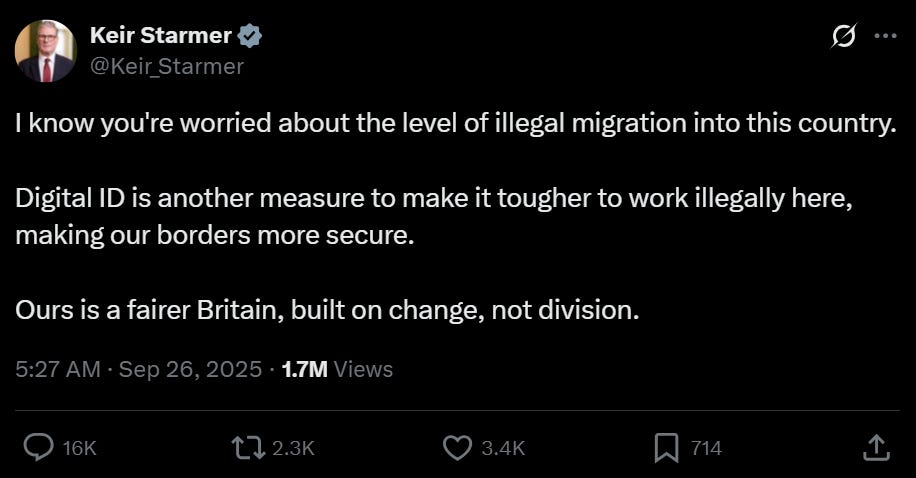UK unveils universal mandatory ‘Brit Card’ Digital ID
Prime Minister Keir Starmer has revealed plans for a compulsory smartphone-based digital ID, dubbed the “Brit Card,” which adults would be forced to use to prove their right to work by 2029.
Prime Minister Keir Starmer has revealed plans for a compulsory smartphone-based digital ID, dubbed the “Brit Card,” which adults would be forced to use to prove their right to work by 2029. The government claims this will help crack down on illegal immigration and employment.
But the UK already issues official ID to asylum seekers: the Application Registration Card (ARC). The card is a photo ID proving someone has claimed asylum and notes whether they are allowed to work. Once refugee status is granted, people receive a Biometric Residence Permit, which serves as an official identity and work permit.
A petition against the scheme gathered well over 1,453,241 signatures at the time of publication, a day after the announcement.
Meanwhile, Canada is laying much of the same groundwork. The federal government has tied digital ID to its Digital Charter and works with provinces to build a shared framework. Ontario, Quebec, Alberta, and Saskatchewan are drafting their own systems; B.C. already uses a digital services card. Banks also support it, saying it will reduce fraud and speed transactions.
Nick Taylor, chairman of Reform Norwich, told True North that digital IDs “will make no difference to the number of illegal immigrants” and said Canadians should expect similar government overreach from Prime Minister Mark Carney.
The British public is well-acquainted with Carney, who served as the governor of the Bank of England from 2013 to 2020.
“Carney is another globalist,” he said “so he will certainly try to force digital ID on Canadians followed soon afterwards by a CBDC.”
“Here the Liberal Democrats, Conservatives and Reform UK all oppose digital ID.”
“It will make no difference to the number of illegal immigrants landing on our shores or to the number of illegals entering the black economy.”
Starmer’s announcement comes just months after Labour passed the Online Safety Act, which empowers regulators to force tech platforms to remove illegal or harmful content. Labour says it’s a necessary move to protect children and clean up the internet, while civil rights groups say it gives regulators, and tech firms themselves, too much power over free speech.
Big Brother Watch, Liberty, and the Open Rights Group warn that mandatory digital ID will create a “checkpoint society,” vulnerable to hacking and government overreach. They say it risks expanding from work checks to housing, banking, and even voting, while excluding people without smartphones.
Canada’s version is also under debate in Parliament. Heritage Minister Steven Guilbeault told a televised House of Commons heritage committee on Wednesday that the government’s long-delayed Online Harms Act is aimed only at “clearly harmful content” and is “designed to comply with the Charter of Rights and Freedoms,” as cabinet takes another look at how to move the controversial bill forward.
During the committee, Guilbeault said, “Online safety is certainly about protecting kids, but it’s obviously more than that,” adding that the legislation shields vulnerable people from exploitation.
The UK has tried ID cards before. The Identity Cards Act 2006 created a national ID system under Tony Blair’s Labour government, but it was deeply unpopular over privacy concerns and fears of mass surveillance.
When the coalition government came to power in 2010, it scrapped the scheme, and by 2011, both the Act and the national identity register were formally repealed.






This will be used to manage “behaviour” compliance, per WEF goals. China uses this already against its citizens. Debanking, gov’t fees/penalties, travel restrictions, purchase restrictions, the sky is the limit.
All to protect you, from yourself!
The Liberals showed during Covid and the convoy that they have no trouble shutting down their opponents. This ID does not bode well for freedom of speech or future elections.